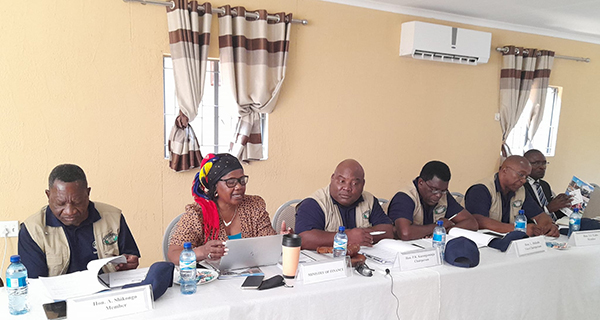Albertina Nakale
Many local authorities in Namibia continue to reflect weak financial management systems, thereby compromising service delivery. This comes after daunting findings by the standing committee on public accounts and economics, which reviewed reports of the Auditor-General for one regional council for the financial year ending 31 March 2018 and for various local authorities for the financial year ending 30 June 2016; 2017, 2018, respectively.
The committee noted with concern a situation where the elected officials overseeing the local authorities and regional councils are not familiar with the audited reports of their institutions.
“This is a worrisome situation because the elected councillors who can be compared to board members need to be familiar with the financial status of the institutions they preside over to provide effective leadership and guidance in the council’s affairs for the benefit of the masses,” remarked the committee chairperson, Peter Kazongominja.
The parliamentary committee called the accounting officers from various towns, municipalities and village councils before public hearings, which took place from 25 October 2021 to 4 November 2021 at their respective offices.
Those who appeared include officers from Keetmanshoop municipality; //Kharas Regional Council; Gibeon, Gochas and Aranos village councils as well as Rundu, Eenhana, Omuthiya and Okakarara town councils.
During the public hearings, the accounting officers had to respond to several shortcomings raised by the Auditor-General in their respective audit reports.
Among the shortcomings raised include failure to keep accounting records as necessary to reflect transactions by regional councils, as required by section 39 (1) of the Regional Councils Act, 1992 (Act 22 of 1992) as amended.
The other concern is the uncertainties on what municipalities, town and village councils should do to write off the pre-independence debt.
Accounting officers also failed to comply with applicable legislation, accounting standards and other mandatory reporting requirements approved by the Auditor-General.
Equally, regional councils, municipalities, towns and village councils failed to table and consider at their ordinary meetings the report of the Auditor-General and decide on rectifying steps on irregularities revealed by the audit report as required in section 40 (3) of the Regional Councils Act, 1992 (Act 22 of 1992), as amended.
The lack of capacity on the part of accounting officers to compile financial statements as per the requirement of the law was another issue of concern. Kazongominja indicated that the non-submission of supporting documents by the accounting officers and finance managers to the auditors at the time of audit remains an issue of concern to the committee.
He argued failure to submit supporting documents is always associated with poor filing systems or deliberate attempts to cover the misappropriation of public funds. Therefore, the committee appealed to local authorities and regional councils to ensure they keep proper filing of their records and avail them to auditors at the time of audit.
Another notable concern that cut across many of the institutions engaged was the inability of staff to efficiently execute their duties. In some instances, this was compounded by the existing staff structure and remuneration packages that affect recruitment and staff retention in local authorities. The committee recommended the line ministry seriously and urgently look into the staff structure and remuneration packages at local authorities.
The chairperson said the audited reports considered were referred to during the term of the fifth National Council on 4 November 2019.
“In 2020, the previous National Council public accounts committee could not conduct hearings on those reports due to the Covid-19 pandemic outbreak, a situation that continued to affect the sixth National Council public accounts committee, as it could only conduct public hearings from 25 October to 4 November 2021, after the Covid restrictions in place then were relaxed,” he noted.



